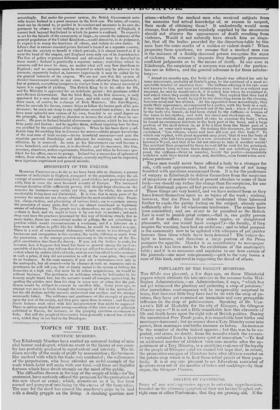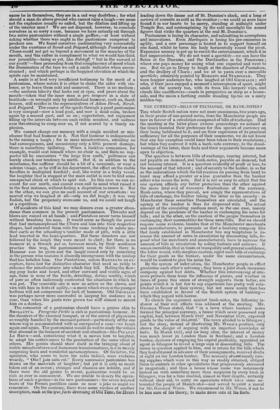DECLINE OF PANTOMIME.
SOME or our cony emporaries appear to entertain apprehensions, founded on the alarming- symptom of' their not having laughed out- right once at either Pantomime, that they are growing old. If the cause be in themselves, they are in a sad way doubtless ; for what should a man do above ground who cannot raise a laugh—we mean not the explosion usually so called, but the dilation and lifting up ' of the interior man ? We are not disposed, however, to conclude ourselves in so sorry a case, because we have actually sat through two entire pantomimes without a single guffaw,—at least without asking whether there Was ought in the pantomime competent to produce one. We found ourselves cachinnating very successfully under the exertions of Scrub and Foigard, although Pantaloon and Clown could not get as beyond a movement in the muscles of the mouth, and this rather in compliment to what we would fain think our juvenility—being as yet, like Falstaff', "but in the vaward of our youth"—then proceeding from that complacency of mood which the illumination of the face we call a smile indicates when uncon- strained; and which perhaps is the happiest elevation at which the spirits can be maintained. A smile is at best very insufficient testimony to the merit of a pantomime, whose nature it is either to shake the sides with vio- lence, or to leave them cold and unmoved. There is no medium ; —the uniform hilarity that looks out at eyes, and peers about the mouth—token that the inner man is pro tempore in a state of beatitude—is wrought only by intellectual humour, such as, thank heaven, still resides in the representatives of Adam Broth, Scrub, and Foigard. The conrse of the spirits through a good pantomime is very unequal—now a loud gust, and now a dead calm, broken again by a second gust, and so on ; expectation, not enjoyment filling up the intervals between each risible accident, and sadness ever threatening to creep over us, if not scared by a timely ex- plosion.
We cannot charge our memory with a single accident or mis- chance that had humour in it. Not that humour is indispensable to the raising a laugh ; for in mere misadventures, entailing no had consequences, and occasioning only a little present damage, there is something titillating. When a luckless companion, for example, would seat himself where no chair is, and finds no sup- porter till he encounters "the huge firm earth," politeness can barely check our tendency to mirth. But if, in addition to the mischance, the sufferer should be a bit of a coxcomb, or wear a solemn visage, or be stiff in his deportment, the effect on the risible faculties is multiplied fourfold ; and, like water in a leaky vessel, the laughter that is stopped at the main outlet is sure to find some unexpected chink at which to spirt out. In this case we can ac- count for our mirth, and cannot even call to mind what raised it in the first instance, without feeling a disposition to renew it. But in the other, we can give no such account of our sensations : we marvel why we laughed at all—only we did laugh ; it was very foolish, but the propensity overcame us, and we could not laugh at a repetition.
Of accidents of this kind we may discern even a greater abun- dance than common in the present pantomimes. Thwacks and blows are rained on all hands ; and Pantaloon never turns himself without breaking his nose. It would seem as though the power that had metamorphosed the Clown and him into their respective shapes, had endowed them with the same tendency to salute mo- ther earth as the schoolboy's tumbler made of pith, with a little lead inserted in the head-quarters. But these disasters are not followed by the laugh they were meant to elicit ; for there is no humour in a thwack per se, however much, by their assiduous practice this way, the pantotnimists seem to think there is. Humour can be given and the laugh raised only by something in the person who sustains it absurdly incongruous with the mishap that has befallen him. Our Pantaloons, unless BARNES be an ex- ception, have lost the distinctive character that used so richly to enhance the misadventures into which they fell. Bating the flow- ing gray locks and beard, and other outward and visible signs of age, there is none of the feeble, drivelling, doting senility, which of yore so often ludicrously contrasted the situations in which he was put. The venerable sire is now as active as the clown, and vies with him in feats of agility,—a merit which even in the younger but-limn will not compensate for lack of humour. Old GRIMALDI was perhaps never more successful in keeping his audience in a roar, than when his joints were grown too stiff almost to mount him on a donkey.
The concoctor of a pantomime should have a genius akin to SMOLLETT'S. Peregrine Pickle is rich in pantomimic humour. At the disasters of the classical banquet, or of the crowd of physicians so roughly handled by the incensed patient—particularly of the one whose wig is accommodated with so unexpected a case—we laugh again and again. The pantomimist would do well to study the writers that abound in the humour of accident and situation—like PIGAULT LE BRUN— and, considering what it is moves him to laughter, to adapt his contrivances to the production of the same effect in others. His genius should show itself in the bringing about of risible misadventures and humorous transformations, ILA in merely surprising feats and wonderful metamorphoses. Of the latter, the spectator, who came to have his sides tickled, soon exclaims wearily, " Ohe ! jam satis est." Every successive pantomime has drawn on the materials of laughter ; but yet it is only so much taken out of an ocean ; changes and chances are infinite, and if there were the old genius to invent, pantomime would be as rich as ever in amusement. We are unable to descry the opera- tions of such a genius—in the new pantomimes : the seven leagued boots of the French postillion came as near a joke as aught we remember. On the contrary, there were some strokes of another description, such as the ipso facto drowning of Old Time, the 1-1OUra leading down the dance out of St. Dunstan's clock, and a long et ctvtera of conceits as cold as the weather ;—we could as soon have found it in our hearts to be merry, standing at midnight under Temple Bar, and contemplating by the cold moonlight the armed figures that strike the quarters at the real St. Dunstan's. Pantomime is losing its character, and submitting to corruptions and innovations. Even Harlequin is losing his pre-eminence in agility, and a new personage is foisted in to support himself on one hand, whilst he turns his body horizontally round the pivot. Expensive scenery is got up to enrich the entertainment, which it in fact impoverishes. We do not want a spectacle—we can have the Seine at the Diorama, and the Dardanelles in the Panorama ; where one pays money for seeing what one expected and went to see. But we go to Drury to laugh at the disasters of Pantaloon, and the drollery of Clown ; and we sit to yawn over a moveable specteicle; admirably painted by ROBERTS and STANFIELD. They were happier audiences far, who laughed at Old GRIMALDI ; and who, if their jaws enjoyed a moment's interregnum of quiet, might smile at the scenery too, with its trees like lawyers' wigs, and clouds like cauliflowers—roads in perspective as steep as a house- side, and the moon a farthing candle standing tip-toe on a misty midden-top.






















 Previous page
Previous page